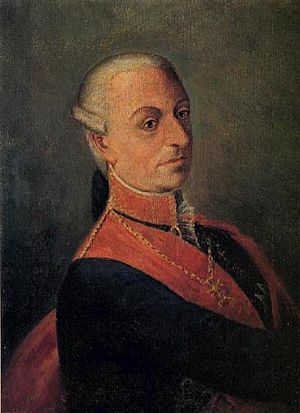Francesco d'Aquino, Prince of Caramanico facts for kids
Francesco Maria Venanzio d'Aquino, known as the Prince of Caramanico, was an important figure in the Kingdom of Naples during the 1700s. He was born in Naples on February 27, 1738, and passed away in Palermo on January 9, 1795. He served his kingdom as an ambassador in both London and Paris. Later, he became the viceroy of Sicily, which meant he was the king's main representative there.
Life and Career
Family Background
Francesco d'Aquino was the son of Prince Antonio and Ippolita Pignatelli. In 1767, he married Vittoria de Guevara. When his father died in 1775, Francesco inherited several important titles, including Prince of Caramanico, Duke of Casoli, Marquess of Francolise, and Count of Palena.
Early Public Service
Francesco d'Aquino was a supporter of Freemasonry in Naples. In 1769, he became the Grand Master of a group called the 'Victory Lodge'. At one point, a powerful minister named Bernardo Tanucci tried to stop the Freemasons and the queen, Maria Carolina of Austria, from reducing Spanish influence in Naples. However, with support from others, the queen and the Freemasons became stronger, leading to Tanucci's removal from power. This event also strengthened the queen's connection with Caramanico.
In 1780, Caramanico was chosen to be Naples' ambassador to London. While there, he became a member of the Royal Society, a famous group for scientists and thinkers. In 1784, he moved to Paris to serve as ambassador to France until 1786. When he returned to Naples, he received a special award called the Order of Saint Januarius and became a member of the Council of State, which advised the king.
Viceroy of Sicily
In 1786, Francesco d'Aquino was appointed viceroy of Sicily, taking over from Domenico Caracciolo. As viceroy, he had great power, acting as the king's representative. He continued the work of reforming Sicily, aiming to limit the power of the wealthy barons and strengthen the central government.
To achieve this, he made several important changes:
- In 1788, he ended "angaria", which were free services that peasants had to provide to their feudal lords.
- In 1789, he completely removed the last parts of serfdom in the countryside. Serfdom was a system where peasants were tied to the land and had very few rights.
- He also reduced the number of noble seats in the Deputazione del Regno, which lessened the nobles' influence in government.
Caramanico admired the ideas of equality that came from the French Revolution. He kept good relations with the French, even after King Louis XVI was executed. He also reformed the university of Catania and made Italian the official language for all public documents, replacing Latin. He was very popular among the poor because of his charitable work, especially during an epidemic in 1792-1793. Francesco d'Aquino died suddenly on January 8, 1795, with some people believing he might have been poisoned.
See also
 In Spanish: Francesco d'Aquino para niños
In Spanish: Francesco d'Aquino para niños
 | Toni Morrison |
 | Barack Obama |
 | Martin Luther King Jr. |
 | Ralph Bunche |


